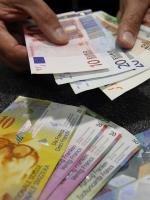 For the last week, I’ve felt as though I ought to write about what has happened in Switzerland, but I haven’t been able to find a hook. It’s still kind of hard to get too excited about Europe generally, and Switzerland in particular, with its economy that is roughly 4% of our own. Just the same, Switzerland’s per capita GDP is roughly $80,000 and the US’s is only $50,000. So I’m not smug about this; it is just that Switzerland is a small country. What’s more, what is wrong with European economic policy seems pretty simple: shared currency, austerity, and German arrogance. It is this last item that provides the hook.
For the last week, I’ve felt as though I ought to write about what has happened in Switzerland, but I haven’t been able to find a hook. It’s still kind of hard to get too excited about Europe generally, and Switzerland in particular, with its economy that is roughly 4% of our own. Just the same, Switzerland’s per capita GDP is roughly $80,000 and the US’s is only $50,000. So I’m not smug about this; it is just that Switzerland is a small country. What’s more, what is wrong with European economic policy seems pretty simple: shared currency, austerity, and German arrogance. It is this last item that provides the hook.
The German government has really been impossible throughout this economic crisis. It has used the rhetoric of moral rectitude to bludgeon the rest of the European Union, “If only you acted like us, you would be doing well!” That’s just not true. As Paul Krugman is fond of saying, “Economics is not a morality play.” Germany wants to continue to keep its exports cheap, thus helping to keep the rest of Europe depressed. It’s typical conservative “shared sacrifice”: you sacrifice everything and I’ll share nothing.
Last week, Switzerland did something that is kind of the opposite. It stopped pegging the Swiss franc to the euro. Up to that point, the franc had been artificially lowered because the Swiss economy is actually doing quite well. This act caused the franc to shoot up in value — as much as 30% at one point. This is good news for the rest of the EU. It means that Swiss exports will be more expensive and Swiss imports will be cheaper. It should also mean that the Swiss economy should take a little hit and unemployment should go up (but unemployment is very low now).
This highlights one of the most exasperating issues I have when talking to people about economics. Pretty much everyone thinks that a strong dollar is a good thing. It sounds good, right? And it is good — for the 1%. If you have a lot of money, then the more that money is worth, the better. But most people don’t have a lot of money, and most people need a job. For these people, a weak dollar is better because it makes our exports more competitive and imports less competitive.
An interesting aspect of this is that most people are upset (or were in 2012 when the media was covering it) that China was artificially holding down the value of its currency. This, everyone understood, made it harder for US businesses to sell to China and made Chinese businesses unfairly competitive selling to us. But the very same people who were upset about this, also wanted a strong dollar. What China is doing is strengthening our dollar! It is inconsistent to say, “I want a strong dollar and I want American exports to be competitive!” If you are for the strong dollar, you are for shipping jobs overseas for the benefit of people who already have too much money.
So what Switzerland did last week is what we’ve wanted China to do for years and years. It’s strange that Paul Krugman thinks it is a bad thing. I think that Dean Baker, as usual, has this one right. In fact, he even related it to Germany:
This is what needs to happen. The shared currency — especially the fact that Germany is part of it — is what is stopping the currency in Greece and other depressed nations from weakening so that their economies can grow. The Swiss National Bank didn’t do this for altruistic reasons. Krugman is probably right that its reasons are bad. But it will have a good effect on the EU.





